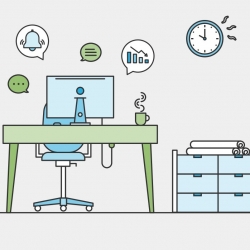December 9, 2020
Search Results for: anxiety
December 4, 2020
Employee happiness and loyalty tested by furlough schemes
by Neil Franklin • Flexible working, News
 A newly commissioned survey of 1,000 people conducted by Censuswide on behalf of KnowBe4, claims that almost a third of respondents (28 percent) feel less loyal to their employer post-furlough. Of these individuals, 70 percent conceded to either not feeling supported by their employer, receiving little to no information or guidance prior to returning to work and/or did not receive regular communications from them. In fact, the actions employers take, or lack thereof, to ease the transition from furlough appears to play a significant role in employee sentiments upon their return to work. More →
A newly commissioned survey of 1,000 people conducted by Censuswide on behalf of KnowBe4, claims that almost a third of respondents (28 percent) feel less loyal to their employer post-furlough. Of these individuals, 70 percent conceded to either not feeling supported by their employer, receiving little to no information or guidance prior to returning to work and/or did not receive regular communications from them. In fact, the actions employers take, or lack thereof, to ease the transition from furlough appears to play a significant role in employee sentiments upon their return to work. More →
November 25, 2020
Third of people working from home worry about mental health
by Jayne Smith • News, Wellbeing, Working lives
 In a recent survey of 4,000 office-based employees and 1,000 employers in the UK, U.S, Singapore and the UAE, a third of employees expressed concern for their mental health whilst working from home during the COVID-19 pandemic. The research, conducted by health benefits provider, Aetna International, examines the perceptions of both employers and employees when it comes to corporate health and well-being. More →
In a recent survey of 4,000 office-based employees and 1,000 employers in the UK, U.S, Singapore and the UAE, a third of employees expressed concern for their mental health whilst working from home during the COVID-19 pandemic. The research, conducted by health benefits provider, Aetna International, examines the perceptions of both employers and employees when it comes to corporate health and well-being. More →
November 18, 2020
Generation BETA is the latest demographic grouping you need to acknowledge, claims report
by Jayne Smith • News, Technology, Working culture
 GlobalWebIndex (GWI), together with LinkedIn’s B2B Institute, has launched “Work in BETA: The Rising B2B Decision Maker”. The new report sets out to examine the ‘changing behaviours and attitudes of “the BETAs” – the first cohort of digital natives (21 to 40 year-olds) to assume positions of seniority in business, at a time of dislocation’. More →
GlobalWebIndex (GWI), together with LinkedIn’s B2B Institute, has launched “Work in BETA: The Rising B2B Decision Maker”. The new report sets out to examine the ‘changing behaviours and attitudes of “the BETAs” – the first cohort of digital natives (21 to 40 year-olds) to assume positions of seniority in business, at a time of dislocation’. More →
November 13, 2020
Mental health continues to deteriorate as a result of the pandemic
by Neil Franklin • Flexible working, News, Wellbeing
 Morneau Shepell has published its monthly Mental Health Index report, which claims there is a a consistent trend of negative mental health among Britons at the seven-month mark of the pandemic. The Mental Health Index for October is -13.4, suggesting that Britons’ mental wellbeing continues to be at risk, with declining workplace productivity and the need for support adding to the continuing strain of the pandemic. More →
Morneau Shepell has published its monthly Mental Health Index report, which claims there is a a consistent trend of negative mental health among Britons at the seven-month mark of the pandemic. The Mental Health Index for October is -13.4, suggesting that Britons’ mental wellbeing continues to be at risk, with declining workplace productivity and the need for support adding to the continuing strain of the pandemic. More →
November 12, 2020
Covid-19 crisis has created unique challenges for working single parents
by Jayne Smith • Flexible working, News, Working lives
 New research published by Gingerbread and the Institute for Employment Studies (IES) highlights unique challenges for working single parents including for those who will lose their jobs as a result of the Covid-19 Crisis. As the country experiences a second Lockdown, and with growing unemployment and continued childcare restrictions, it is vital that the government provide better support to single parents. More →
New research published by Gingerbread and the Institute for Employment Studies (IES) highlights unique challenges for working single parents including for those who will lose their jobs as a result of the Covid-19 Crisis. As the country experiences a second Lockdown, and with growing unemployment and continued childcare restrictions, it is vital that the government provide better support to single parents. More →
November 4, 2020
Fear of job loss is making workers less open about mental health
by Jayne Smith • News, Wellbeing, Working lives
 Workers have become less open about their mental health struggles since the coronavirus outbreak because of fears they could lose their jobs if they speak up, claims new research from the Enterprise Research Centre. More →
Workers have become less open about their mental health struggles since the coronavirus outbreak because of fears they could lose their jobs if they speak up, claims new research from the Enterprise Research Centre. More →
October 14, 2020
Many people are demoralised, disconnected and worried. We need to talk about that.
by Steven Buck • Comment, Wellbeing, Working lives
 Since March, Glint has been creating a dataset which now consists of 7 million survey responses from employees around the world and across a broad range of industries. Our aim is to take the pulse of the global workforce to see how it’s faring with our ongoing global health crisis and to understand its effects on work. More →
Since March, Glint has been creating a dataset which now consists of 7 million survey responses from employees around the world and across a broad range of industries. Our aim is to take the pulse of the global workforce to see how it’s faring with our ongoing global health crisis and to understand its effects on work. More →
October 9, 2020
Working from home seems to relieve the burden of imposter syndrome
by Neil Franklin • Flexible working, News, Working lives
 In a new study of around 2,000 workers conducted in partnership with the University of Nottingham, Totaljobs claims to have seen a 57 percent decrease in feelings of imposter syndrome compared to a similar survey last year, with just 3 in 10 workers in 2020 finding themselves experiencing feelings of what the study describes as Imposter Phenomenon. The 2019 study claims that 7 in 10 workers in the UK had suffered from complex ‘imposter’ feelings that can sabotage careers and harm our mental health. More →
In a new study of around 2,000 workers conducted in partnership with the University of Nottingham, Totaljobs claims to have seen a 57 percent decrease in feelings of imposter syndrome compared to a similar survey last year, with just 3 in 10 workers in 2020 finding themselves experiencing feelings of what the study describes as Imposter Phenomenon. The 2019 study claims that 7 in 10 workers in the UK had suffered from complex ‘imposter’ feelings that can sabotage careers and harm our mental health. More →
October 8, 2020
Most people with mental health issues would prefer a robot therapist to a human
by Jayne Smith • News, Technology, Wellbeing
 2020 has been the most stressful year in history for the global workforce and people want robots to help, according to a new study by Oracle and Workplace Intelligence, an HR research and advisory firm. The study of more than 12,000 employees, managers, HR leaders, and C-level executives across 11 countries claims that the COVID-19 pandemic has increased workplace stress, anxiety, burnout and other mental health issues for people all around the world, and would prefer a robot instead of other people to help. More →
2020 has been the most stressful year in history for the global workforce and people want robots to help, according to a new study by Oracle and Workplace Intelligence, an HR research and advisory firm. The study of more than 12,000 employees, managers, HR leaders, and C-level executives across 11 countries claims that the COVID-19 pandemic has increased workplace stress, anxiety, burnout and other mental health issues for people all around the world, and would prefer a robot instead of other people to help. More →
October 2, 2020
Time for businesses to establish more meaningful wellbeing initiatives
by Jolawn Victor • Comment, Wellbeing
 Over the years, mental health has become a prominent feature of wellbeing initiatives in many businesses, but especially in the wake of the pandemic. However, our research has found that more than half of the UK workforce (54 percent) do not feel that mental health benefits are a priority in their organisation. This is despite half of workers believing that mental health benefits are essential post-COVID-19. More →
Over the years, mental health has become a prominent feature of wellbeing initiatives in many businesses, but especially in the wake of the pandemic. However, our research has found that more than half of the UK workforce (54 percent) do not feel that mental health benefits are a priority in their organisation. This is despite half of workers believing that mental health benefits are essential post-COVID-19. More →






 Heightened anxiety during the Covid-19 pandemic has led to employees working longer hours and taking fewer sick days, all the while becoming less fulfilled by work and life, according to the latest analysis from
Heightened anxiety during the Covid-19 pandemic has led to employees working longer hours and taking fewer sick days, all the while becoming less fulfilled by work and life, according to the latest analysis from 



















October 29, 2020
Workplace culture is not something to be changed with hashtags
by Kirsty Ritchie • Comment, Wellbeing